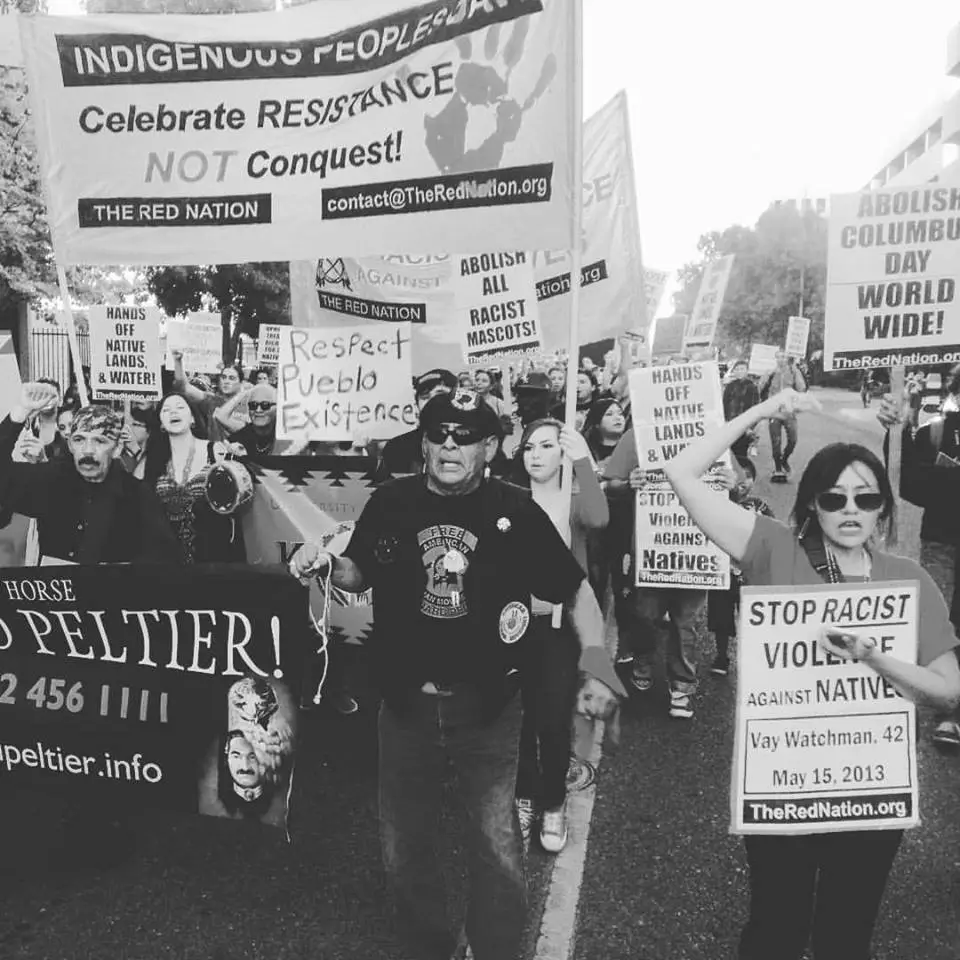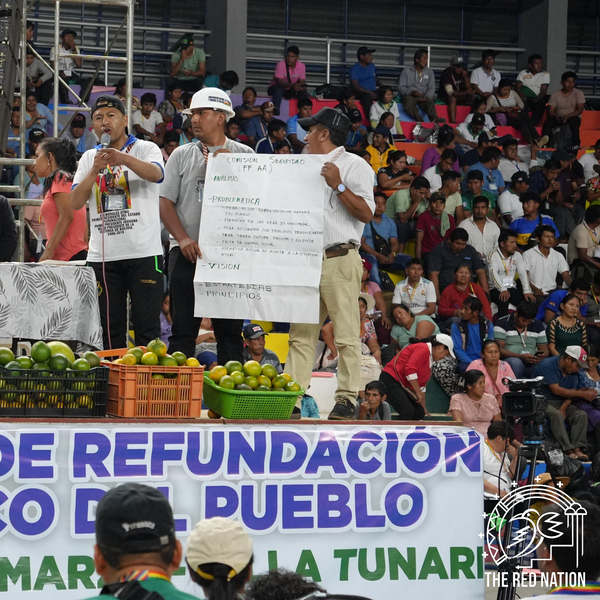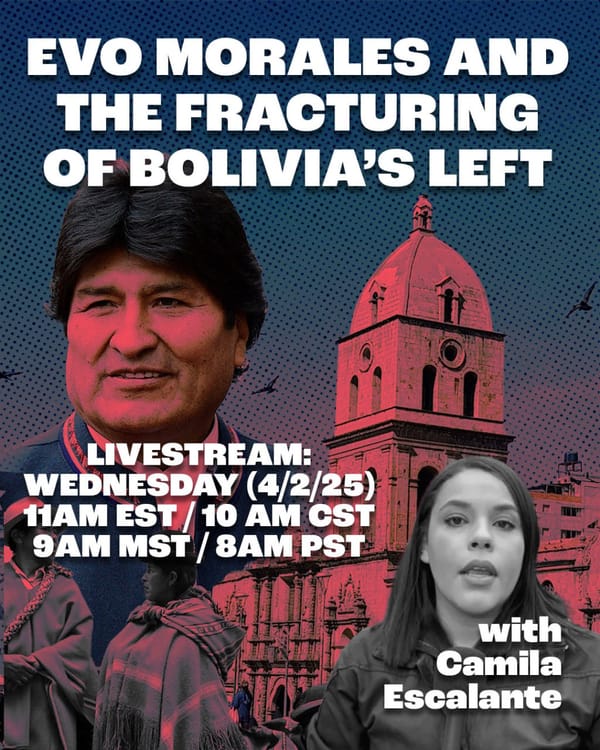Native Liberation: The Way Forward

by Nick Estes
These were the concluding remarks to the first annual Native Liberation 2016 Conference convened at the Larry Casuse Center in Albuquerque, NM on Aug. 13, 2016. Nick Estes is a co-founder of The Red Nation and a member of the Leadership Council.
The Red Nation formed in November 2014 out of a collective desire to create a platform for revolutionary Native organizing and to fight back against this settler colonial system that seeks our annihilation. That very summer, two Navajo men, our relatives Allison “Cowboy” Gorman and Kee “Rabbit” Thompson, were brutally murdered by three non-Native men. The story is familiar to most of us. Our relatives — our aunties, uncles, cousins, brothers, sisters, mothers, fathers, grandparents, and even ourselves — are cast as outsiders, exiles in our own homelands in places we call border towns, the white-dominated settlements that ring Indian reservations where persistent patterns of police brutality, rampant discrimination, and violence against Natives define everyday life. The men who murdered Cowboy and Rabbit later admitted to committing similar violent acts against 50 others in a one-year period. They told investigators they were looking for a “good time,” and Native people were their playthings, just like the white boys in Farmington who attacked and murdered Navajo men “for fun” in what they call “Indian rolling,” or like how rich, racist white men like Dan Snyder, the owner of the infamous Washington football team, use Natives as playthings for entertainment and mascots that celebrate the scalping and mutilating of Native bodies. Natives become entertainment objects for sport and killing because in this society we are unreal and not fully human. Cowboy and Rabbit’s killers spent more than an hour mutilating their bodies to the point they were unrecognizable. It was so bad authorities could not identify them and neither Cowboy nor Rabbit carried personal ID. All-too-common among Albuquerque’s unsheltered community, the Albuquerque Police Department (APD) confiscated and destroyed the men’s IDs — which included drivers’ licenses and CIB cards — to prevent them from buying alcohol or receiving basic human rights, such as access to housing, food, medical care, and employment. Even before they were killed, the APD and this settler society had marked and sentenced Cowboy and Rabbit to a certain kind of death, a social death, where they were excluded, like most Natives, from the realm of the living and relegated to a place where they were considered killable and disposable.
When we founded The Red Nation, this was our primary concern, to address the common experience of Natives: four of every five Natives lives off-reservation in border towns, which include places like Gallup, Farmington, Winslow, Albuquerque, Denver, Rapid City, and Phoenix, to name just a few. Why is this significant? Typically, Natives living off-reservation are considered unauthentic or somehow less Native. They are derisively referred to as “Urban Indians.” The truth is that reservations were created as open air concentration camps, to contain and limit our movements across land that was rightfully ours. Our ancestors did not choose reservation life; it was forced upon them. Natives who “went off the reservation” were the revolutionaries and rebels who refused confinement. In those days, those who willfully crossed the reservation borders were considered renegades, outlaws, or hostiles. They were usually hunted down, summarily shot, hanged, or imprisoned by law enforcement or by vigilantes. In other words, Natives off the reservation have always been deemed criminal, deviant, and in the way. Today, the recent police killings of Loreal Tsingine, Allen Locke, Sarah Lee Circle Bear, Jacquelyn Salyers, and many more are evidence that the criminalization and extermination of Native life is fundamental to settler society. And border towns literally thrive on Native death.
This is our common experience and our common struggle. This is why we formed The Red Nation.
In fact, police killings of Natives have increased in just the last year and some predict that number will double by the end of 2016, unless we take action now. Native women make up 30% of all the police killings of women just this year, even though Natives make up barely 1% of the national population. On top of this, Natives are killed by police at the highest rate. Some attempt to parse out these horrible statistics to suggest that Natives have it worse than other groups, as if being murdered by the police is a competition. The truth is that Natives, Blacks, and Latinxs have historically been the targets of the racist police state, the colonial system that enslaved Blacks for their labor, killed Indians for their land, and created a cheap, exploitable labor pool from Indigenous-descended people, now called Latinxs. And because of this reality, as stated in Point 4 of our 10 Point Program, The Red Nation stands with all victims of police brutality. We recognize that undoing the system that oppresses everyone requires multinational unity and class solidarity among the racialized poor, colonized, and working class peoples.
To understand why the Native struggle is essential, then, we must first begin with why Natives are targeted for elimination: to gain access to territory. Despite popular belief, Natives are not targeted and killed for our culture, spirituality, religion, or civilization. We are eliminated so that corporations and the settler state can gain access to our territory and resources. That requires the liquidation of our societies, the forced removal of our people from the land, the creation of a blood quantum system that dilutes our identity and decreases our population, the confinement to reservations or prisons, the breaking up of our land base and collective identities, and the hyper-policing of our people. Elimination also requires that Natives in border towns like Albuquerque are seen as nuisances and are commonly referred to as “drunk Indians” or “transients.” Both stereotypes are criminalized, although by definition neither is illegal. Police and settlers often tell us to “Go back to the reservation!” or “You’re not from the community!” In those moments, Natives become a criminal element, as if we’re the ones who don’t belong. It’s what Native bodies off-reservation represent that makes us a threat. Native bodies off-reservation represent the unfinished business of settler colonialism; we’re physical reminders that this is not settler land — this is stolen Native land. Despite their best efforts to kill us off, confine us to sub-marginal plots of land, breed us white, or to beat or educate the Indian out of us, we remain. We remain because we resist.
We remain as evidence that this is still, and will always be, Native land. We represent a challenge to the legitimacy of the colonial project of border towns and cities because we refuse to quit being Indians when we leave the reservation. We refuse to obey colonial borders. We refuse to disappear and to be quiet.
The Red Nation represents the unification of Natives outside of the institutions of power — taking the struggle back where it belongs: in the hands of the people. Our ancestors did not establish corporate foundations and boards. They fought for their dignity, lands, and lives. They expect the same from us. Corporate and colonial state institutions still dominate our present condition and, as a result, they structure and contain the free will and humanity of Native people. We have to transcend these power structures that, by design and intention, ultimately limit and strangle our lives. To achieve this new humanity, we have to refuse the false promise of capitalistic development — which is commonly disguised as tribal economic self-determination — and state-sponsored colonial reconciliation — which is commonly disguised as community healing and individual self-fulfillment. You cannot heal from a system that continues to violate and kill the land and our relatives unless you dismantle that system. Although seductive, these “solutions” do nothing more than carry on, and carry out, the same power structure that Native people have been resisting for the last five centuries: colonialism and capitalism. The healing of our wounds can only happen if we annihilate profit-making and colonial enterprises.
Instead of non-profits, we need anti-profits organizing independent of corporate influence and state co-optation, and embedded in the true power of every society: the common people. The poor. The oppressed. The marginalized. In the Lakota language, we call our common people ikce wicasa. In Native societies, our common people are those who face the highest rates of violence and discrimination: our youth, our women, our LGTBQ, and our poor relatives. In other words, the broad swath of Native societies today. This is the common experience of Native people.
The current landscape of struggle pits organizations and groups of people against each other, vying for control over resources made scarce by austerity measures and corporate monopolies. Our struggle is not for funding streams or profit-making off the misery of the powerless. We see how organizations and movements mimic corporate and bourgeois competition over brands, logos, name recognition, clientele, and power. We refuse to participate in this corporate model that dominates community organizing. Instead, we organize according to a principle of unity to unite Native peoples and all oppressed peoples in a common struggle beyond national borders and racial and gender identities. That’s what separates revolutionary organizing and Native liberation struggles from entities that pit marginalized populations against each other, to compete for funding and resources, without attacking the true source of our collective misery: colonialism and capitalism.
We share an enemy that we must unite against. This is the organizing philosophy of The Red Nation.
Capitalism is the enemy of all life. Climate change, because it envelops the entire planet, makes all life precarious. Poor, oppressed, and Indigenous peoples, however, bear the brunt of rising seas, record droughts, and abnormal weather patterns. As Native people, our kinship with human and nonhuman relatives is fundamental to our being. As I speak, an alliance of Lakota and non-Lakota are laying their bodies on the line to halt a crude oil pipeline from crossing the major fresh water source for millions on the Great Plains, the Missouri River. Our relatives and allies are enacting the sacred duty of the Lakota belief of Wotakuye, or kinship. Kinship, in this way, is unconditional because it is revolutionary love. It is the love for our human and nonhuman relatives and the love for the land that will always trump profit. But the land can no longer sustain us if capitalism continues to stalk the earth in search of new markets, bodies, and resources. For life to live on this planet, capitalism must die. For us Lakotas, it is the owe wasicu, the way of the fat-taker capitalist, that must die for our people to live.
The Great Spirits have declared: capitalism is organized crime and must be destroyed. It is our obligation to act accordingly.
As Native people, we possess an essential tradition to sustain us — a tradition of resistance. From this tradition of resistance arises The Red Nation. In Lakota, we call ourselves and all Native peoples, Oyate Luta, the Red Nation. We are red because we come from the red earth. We are a nation because we have our own laws, language, territory, and customs that have persisted since time immemorial. We claim the land and the land claims us. While the same could be said today, The Red Nation also takes on new meanings. We are red because red is the color of all oppressed peoples’ revolution against their masters; and we exist and are united as a Nation not because of a proven culture, but because we struggle against occupation and exploitation. It is the struggle against the colonial and corporate occupation of Native lands that unites all Native peoples in a common fight alongside other oppressed and marginalized peoples. Settler society and even some of our own relatives, however, use culture and tradition as a weapon to renounce the present and the future of our people in attempt to reclaim a mystical past — a history and time that never was. For example, hetero-patriarchy, the belief of male superiority and heterosexuality, dominates current views on Native “tradition” and “culture.” Most Native societies are matrilineal; never had marriage customs that privileged relationships between only men and women; and possessed multiple genders beyond the binaries of male and female. Yet, we have adopted coercive, sexist, and homophobic Christian and Western values, masking them as our own “traditions” and “cultures.” This is pure bigotry, not tradition, that alibis discrimination, violence, rape, and torture against children, women, and LGBTQ2 relatives. For Native people to live, hetero-patriarchy must be abolished.
This brings us to the last point about Native liberation: treaties. Natives are thought to be a backwards people living in the past. Likewise, the promises made through treaties, agreements, and other arrangements between our people and the colonizers are thought to be ancient documents. After the colonizers broke every treaty, we are told to “Get over it.” The truth is: it’s the U.S. and settler colonial states that have not “gotten over it.” Otherwise, why invest so much time and energy into covering up the fact that this country sits atop stolen Native lands? Treaties are the evidence of our sovereignty. After all, you do not enter treaty negotiations with “domestic” or “dominated” peoples. Treaty-making is one of the oldest international and diplomatic traditions between and among sovereigns. And if we return to the treaties, we see that they are not just historical documents. In fact, they are future-oriented documents. They promise in the future Natives would receive healthcare, employment, education, land, and protection for the partial relinquishing of territory — the material basis for our sovereignty. Those promises have yet to be upheld. It should also be noted, those promises are fundamental human rights for all people, not just Natives. So the upholding of treaty law will surely benefit all humanity because we entered into treaties with the U.S. as equals with the belief that we possessed a common humanity. The U.S. and the corporate interests it represents, however, have refused that humanity. They act as if they have no relatives, no relations, which is the highest insult in Native societies. When we talk of treaties, we speak for that lost humanity. We are the wave of the future, not the past.
We are prophecy.
Four of five Natives do not live on reservation lands, but that doesn’t mean that they have relinquished their treaty rights or their sovereign political identities as Native peoples. It means that we exercise our rights to live where and how we want in our own homelands because that is the ultimate definition of self-determination and sovereignty, collective independence and autonomy. It is important to remember that no people in the history of this world were ever granted their freedom by begging for it from their oppressors. They had to fight for it. They had to win it. Freedom is actualized not given.
We cannot simply “return” to our reservations or “return” to the land to recuperate precolonial lifestyles — however real or imagined they may be — because most of us are simply dispossessed of land and we don’t possess the capital to buy it. The majority are landless and poor. It is admirable that some of our relatives are privileged enough to still live off the land. For the majority, this is simply impossible. What is possible is collective organizing and struggle to transform society to meet the collective needs of Native people and all oppressed peoples, to once again live with the land. Action, however, demands that we build movements outside the structures of power and prioritize everyday people who possess the real power to make these changes. Reforming a system premised on our demise has proven unsustainable. One could argue, in the twenty first century Native people are worse off. We have more people in prison. We have lost more land, not gained it. Our water is being polluted and sold off. Our children are dying at catastrophic rates. Our women are being tortured and murdered by the thousands. And our LGBTQ2 relatives continue to face some of the highest rates of violence anywhere. What little land we still possess is being contaminated and sold off to the highest bidder. Education and employment opportunities have decreased. Access to adequate healthcare is pipedream. We do not have access to healthy foods. Violence in our communities has increased. These are not just headaches that if we ignore they will eventually go away. We can’t fundraise or lobby our way out of this. We can heal as individuals, but the world we inhabit is still bent on our destruction. This is the reality of the ikce wicasa, the common people, our relatives.
It is time to name the systems that kill us — capitalism and colonialism — and call for their destruction so that our people may live. We will not apologize for this, relatives. It is the only right thing left to do. The Red Nation is a movement for life, not death. And for us to live, capitalism and colonialism must die.
Join us in this movement for life!
In the spirit of Popé and in the spirit of Crazy Horse!
Hecetu Welo!




